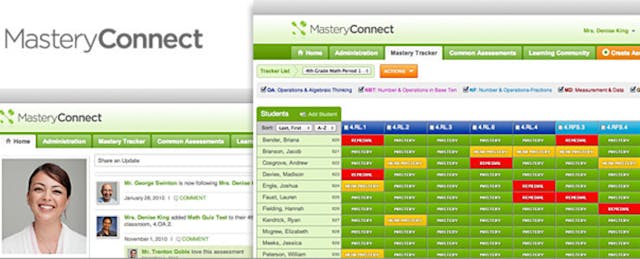When Mick Hewitt started MasteryConnect in 2011, he wanted to go beyond recording the end-of-the-term grades and help teachers gauge students' progress by focusing on "formative assessments," ongoing diagnostics aimed at helping teachers modify their instruction and students' learning activities to promote mastery of content. "There's a big difference between assessment of learning and assessment for learning," says Hewitt, who is also chief executive of MasteryConnect.
Now Hewitt's getting his chance to show exactly what a difference a lone preposition can make: Salt LakeCity-based MasteryConnect just closed its (oversubscribed) A round, scoring $4.125 million in investment dollars. Catamount Ventures led the round, investing $2.125 million. The second largest investor was the Michael & Susan Dell Foundation, which put in $1.5 million. Deborah Quazzo of GSV Advisors, and existing investor, LearnCapital, also joined the round.
See EdSurge's Mastery Connect report here.
Most unusual about the deal is the partnership between a classic venture capital firm and a nonprofit foundation. Catamount doesn't believe it will sacrifice profits by co-investing with a foundation, says Tory Patterson, the Catamount partner who led the deal and will take a board seat with MasteryConnect. Quite the contrary: Patterson is betting that the involvement of the Dell family foundation will help accelerate MasteryConnect's growth. "We care deeply about impact but our sole focus is driving returns," Patterson asserts.
MasteryConnect offers schools software that helps teachers administer and grade formative assessments,whether they are created by a teacher, a friendly colleague or increasingly any educator who takes part in the growing MasteryConnect ecosystem.
Hewitt says his goal is to put teachers in charge of the assessments they give their students--something that cheers his wife and parents, all of whom were educators. "We all agree we need [certain] learning outcomes," Hewitt says. "We believe in putting control back in the hands of teachers--to let teachers assess their students in the ways that they deem best, and to get real-time reports of those results," he says.
Hewitt began to talk with Catamount Ventures almost a year ago, shortly after it closed its $1.1 million seed round. The company has been growing briskly: it's used in almost a quarter of US public (K-12) schools. Although MasteryConnect has been steadily pushing links to Common Core standards, it's indifferent about the precise nature of the assessments used. As a result, more than 25,000 different assessments, many created by teachers, have been shared via MasteryConnect.
In order for the Dell family foundation to take a stake in the company, however, it wanted to see more than a healthy growing business. Among its requirements, the foundation insisted that MasteryConnect ensure that some portion of its users are low-income schools. Catamount's Patterson says that crafting requirements that satisfied both for-profit and non-profit investors, took careful work. "It was a challenge," he concedes. "A lot of credit goes to our [general] counsel."
Foundations have taken equity stakes in only a handful of edtech businesses. Among them: the Gates Foundation along with Retro Venture Partners put $4 million into Inigral in 2011 and re-upped last October for an additional $3.5 million. In addition, Catamount invested in Revolution Foods, which counts the W.K. Kellogg Foundation among its investors. (Kellogg has sought out other for-profit investment opportunities, too.)
The Dell family foundation has made other investments in for-profit investments, including a number of microlending and housing organizations based in India, all of which are aimed at helping the foundation achieve its charitable mission, of “improv[ing] the lives of children living in urban poverty through better health and education,” notes a foundation representative. In 2011, the family foundation acquired an edtech consulting company, Double Line Partners, LLC, which it now runs as a mission aligned, wholly-owned for-profit subsidiary of the foundation.
Requirements to maintain some portion of low-income users could slow any efforts to expand MasteryConnect in, say, private schools or even internationally. Still Patterson insists that for MasteryConnect to succeed, it must serve the core public school market, including low-income schools.
For Hewitt, the requirement to serve lower-income schools will help MasteryConnect achieve what he has long hoped to see: an approach to learning that uses data but is driven by the insights and approach of teachers. That will be good news to teachers, including those who are beginning to push back on the tests that they are required to give. Teachers at Seattle's Garfield High School recently refused to give MAP tests, which "..is not good for our students, nor is it an appropriate or useful tool in measuring progress,” says Kris McBride, who serves as academic dean and testing coordinator at Garfield, according to a school press release. Similarly, California's school superintendent, Tom Torlakson, recently suggested the state skip STAR tests for second grade students.
"We've overtested and under assessed," declares Hewitt. And that's what MasteryConnect hopes to help change.


